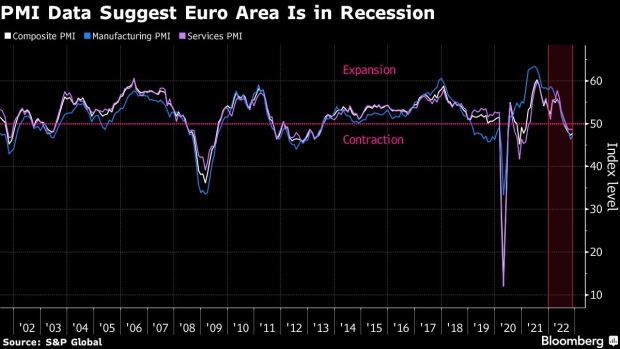Nov 23, 2022
Euro-Area Businesses Signal Slump May Be Shallower Than Feared
, Bloomberg News

(Bloomberg) -- Euro-area businesses see tentative signs that the region’s economic slump may be easing as record inflation cools and expectations for future production improve.
A gauge measuring activity in manufacturing and services unexpectedly rose in November, according to S&P Global. While it still firmly indicates a recession in the 19-nation region is underway, it offers some room to think the downturn may be shallower than previously predicted.
In Germany, Europe’s largest economy, purchasing managers at factories reported an improvement in the availability of supplies and shorter delivery times for inputs. Private-sector output still shrank for a fifth consecutive month, with France seeing its first contraction since February 2021.
For the euro area, data are consistent with a drop in gross domestic product at a quarterly rate of just over 0.2%, according to S&P Global. Its composite purchasing managers’ index rose to 47.8 in November from 47.3 in the previous month. A level above 50 would indicate growth.
‘Severe Downturn’
“It’s clear that manufacturing remains in a worryingly severe downturn, and service sector activity is also still under intense pressure,” said Chris Williamson, an economist at S&P Global. “A recession therefore looks likely, though the latest data provide hope that the scale of the downturn may not be as severe as previously feared.”
The index for the UK also showed a continued contraction in private-sector activity, though the slight uptick in the reading to 48.3 was higher than the drop to 47.5 that economists had expected. S&P Global warned the UK economy is in recession, with the downturn expected to worsen heading into next year.
Read more: UK Recession Worsening as Living Costs Squeeze Bites, PMIs Show
While euro-area orders continued to fall at a steep rate in November and employment growth moderated as a result, warm weather has alleviated some fears of energy shortages in the coming months. Price increases have also eased.
“Not only should this help contain the cost-of-living crisis to some extent, but the brighter inflation outlook should take some pressure off the need for further aggressive policy tightening,” Williamson said.
What Bloomberg Economics Says...
“The euro-area composite PMI survey revealed good news. It suggests the speed with which GDP is dropping has stabilized and that inflation is no longer accelerating. With the ECB most focused on prices, the news on that front will help those on the Governing Council arguing for a 50 basis-point hike in December instead of a 75 basis-point move.”
--David Powell. Click here to read more
Policymakers at the European Central Bank have signaled they’re far from done in raising interest rates and plan to soon start shrinking the institution’s balance sheet. At the same time, appetite for a repeat of the outsized three-quarter point hikes of September and October seems to be waning, with even some of the more hawkish officials embracing a more moderate, 50 basis-point move.
ECB Vice President Luis de Guindos said on Wednesday that the euro-zone economy will very likely contract in the current quarter and the first quarter of 2023. Consumer-price gains will probably start to ease early next year, however, he told an event in Madrid.
“Inflation will remain around current levels, about 10%, in the coming months,” Guindos said. That’s about five times the ECB’s target. Core inflation will stay high, he added.
PMI readings for the US later on Wednesday are predicted to show a lack of growth in the world’s biggest economy. Australian data published earlier showed the PMI index fell to 47.7 from 49.8 in October, the lowest reading since January.
--With assistance from Harumi Ichikura, Mark Evans, Zoe Schneeweiss and Alonso Soto.
(Updates with UK PMIs in sixth paragraph, ECB vice president comments starting in 10th paragraph)
©2022 Bloomberg L.P.






